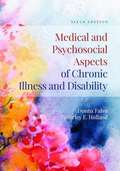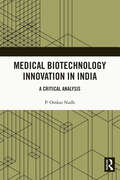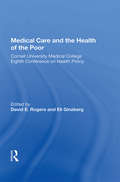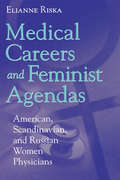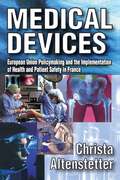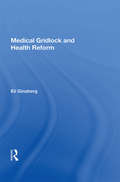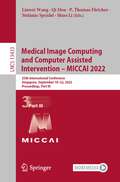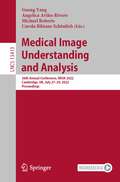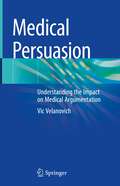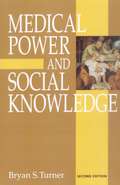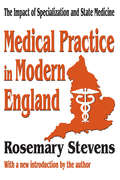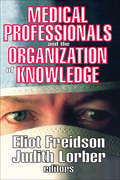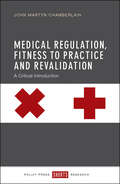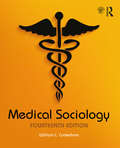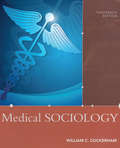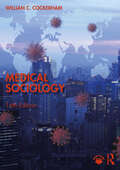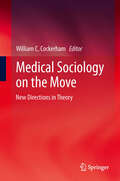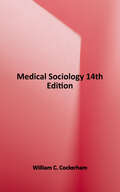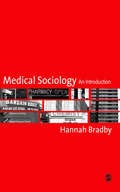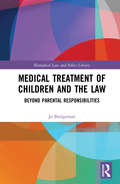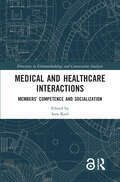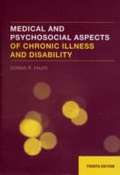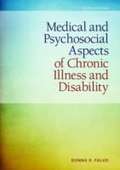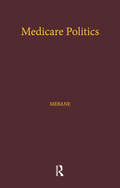- Table View
- List View
Medical And Psychosocial Aspects Of Chronic Illness And Disability
by Donna R. Falvo Beverley E. HollandMedical and Psychosocial Aspects of Chronic Illness, Sixth Edition is intended to teach students, counselors and other medical professionals working with the chronically ill and disabled how to better understand the manifestations of common chronic illnesses and the disabilities among their clients.
Medical Biotechnology Innovation in India: A Critical Analysis
by P Omkar NadhThis book examines the medical biotechnology industry in India through the lens of critical political economy. It discusses the sharp trajectory of growth in the biotechnology business and the state of investments, subsidies and patents which propelled the rise of the industry in India. The book uses in-depth interviews and case studies to analyse the roles of various financial actors, state institutions, and academia in the medical biotechnology ecosystem. Focusing on the relationship between India’s neo-liberal policies and the swift growth of the industry, the author examines the merits and demerits of the current market-driven biomedical ecosystem exploring the trends in the industry, bio-medical start-ups, the use of human resource and capital accumulation process. The book reiterates and emphasizes the need for the democratization of scientific and medical work and for striking a balance between economic gains and public health priorities. Comprehensive and insightful, this book will be of interest to scholars and researchers of science technology society studies, public health, economics, business studies, medical sociology, public policy, and political science.
Medical Care And The Health Of The Poor
by Eli Ginzberg David E. RogersThis book reproduces the seven invited papers that were prepared for the Cornell University Medical College Eighth Conference on Health Policy on the theme medical care and the health of the poor. The topics included looks at physician supply, clinical decisionmaking, and social values.
Medical Careers and Feminist Agendas: American, Scandinavian and Russian Women Physicians (Social Institutions And Social Change Ser.)
by Elianne RiskaThe increasing proportion of women in the medical profession has been followed keenly both by conservative and feminist observers during the past three decades. Statistics both in Europe and in the United States tend to confirm that women work mainly in niches of the health care system or medical specialties characterized by relatively low earnings or prestige. The segregation of medical work has become increasingly recognized as a sign of inequality between female and male members of the medical profession.Medicine as a social organization is not a universal structure: Health care systems vary in the extent to which physicians work in the private or public sector and in the extent to which they have as a corporate body been able to influence their numbers and the character of their work. The aim of this book is not only to review and to provide an account of women's position in medicine but also to provide an analytical framework. The text revolves around three key issues that illuminate this argument: numbers, medical practice, and feminist agendas of women physicians. The issues are addressed in all the chapters but highlighted as central analytical themes in a cross-cultural context.Challenging previous studies of the medical profession, which have assumed for the most part a gender-neutral stance, Riska's text provides a unique focus. Medical Careers and Feminist Agendas presents a comprehensive, cross-national analysis of the current status of women in three societies where the economics of medical practice vary considerably: a market society, a welfare state, and a formerly communist society in transition. Aimed at a wide audience, this book will be useful for years to come in medical sociology, the sociology of professions, and women's studies. Its historical breadth, current data, and trenchant probing will furnish practitioners and policy-makers alike with a needed analytical tool.
Medical Devices: European Union Policymaking and the Implementation of Health and Patient Safety in France
by Christa AltenstetterMedical devices are the bread and butter from which health care and clinical research are derived. Such devices are used for patient care, genetic testing, clinical trials, and experimental clinical investigations. Without medical devices, there is no clinical research or patient care. Without life-adjusting devices, there are no medical procedures or surgery. Without life-saving and life-maintaining devices, there is no improvement in well-being and quality of life. Without innovative medical devices and experimentation, there can be no medical progress or patient safety. Medical devices and medical technology are used to create or support many different products and medical-surgical procedures. This volume on the regulation of medical devices in the European Union, with a focus on France, tackles a topic of interdisciplinary interest and significance for policymakers in countries around the globe. The EU regulatory regime is one of three global regional regimes, and medical products manufactured in EU countries are sold worldwide. As countries confront an aging population on a global scale, with associated increases in chronic diseases, physical handicaps, and multi-morbidity, there will inevitably be an increase in the demand for health services and, concomitantly, the use of medical devices in medical and surgical procedures. This will be the case regardless of whether services are delivered in hospitals, doctors' offices, or at home. The associated risks of a particular device will be the same whatever the country of origin for the device, or where the need occurs. Revolutionary medical advances increase diagnostic capabilities, but they increase the potential of harm and risks to patients. Medical technologies and devices are used ethically most of the time; yet they have the potential for unethical use when scientific medicine is elevated over human life and death. Assumptions that are taken for granted can be dangerous to a patient's health. That is why our understanding of appropriate and effective regulation of medical devices is significant to all people on all continents.
Medical Gridlock And Health Reform
by Eli GinzbergThe early 1990s saw the U.S. health care system under intensifying pressures and strains as a consequence of steeply rising expenditures, an increase in the number of uninsured persons, and a range of other challenges, including increasingly severe pressures on government and employers, the principal payers for health care. As a consequence of thes
Medical Image Computing and Computer Assisted Intervention – MICCAI 2022: 25th International Conference, Singapore, September 18–22, 2022, Proceedings, Part III (Lecture Notes in Computer Science #13433)
by Shuo Li Stefanie Speidel Qi Dou Linwei Wang P. Thomas FletcherThe eight-volume set LNCS 13431, 13432, 13433, 13434, 13435, 13436, 13437, and 13438 constitutes the refereed proceedings of the 25th International Conference on Medical Image Computing and Computer-Assisted Intervention, MICCAI 2022, which was held in Singapore in September 2022.The 574 revised full papers presented were carefully reviewed and selected from 1831 submissions in a double-blind review process. The papers are organized in the following topical sections:Part I: Brain development and atlases; DWI and tractography; functional brain networks; neuroimaging; heart and lung imaging; dermatology;Part II: Computational (integrative) pathology; computational anatomy and physiology; ophthalmology; fetal imaging;Part III: Breast imaging; colonoscopy; computer aided diagnosis;Part IV: Microscopic image analysis; positron emission tomography; ultrasound imaging; video data analysis; image segmentation I;Part V: Image segmentation II; integration of imaging with non-imaging biomarkers;Part VI: Image registration; image reconstruction;Part VII: Image-Guided interventions and surgery; outcome and disease prediction; surgical data science; surgical planning and simulation; machine learning – domain adaptation and generalization;Part VIII: Machine learning – weakly-supervised learning; machine learning – model interpretation; machine learning – uncertainty; machine learning theory and methodologies.
Medical Image Understanding and Analysis: 26th Annual Conference, MIUA 2022, Cambridge, UK, July 27–29, 2022, Proceedings (Lecture Notes in Computer Science #13413)
by Michael Roberts Carola-Bibiane Schönlieb Guang Yang Angelica Aviles-RiveroThis book constitutes the refereed proceedings of the 26th Conference on Medical Image Understanding and Analysis, MIUA 2022, held in Cambridge, UK, in July 2022. The 65 full papers presented were carefully reviewed and selected from 95 submissions. They were organized according to following topical sections: biomarker detection; image registration, and reconstruction; image segmentation; generative models, biomedical simulation and modelling; classification; image enhancement, quality assessment, and data privacy; radiomics, predictive models, and quantitative imaging.Chapter “FCN-Transformer Feature Fusion for Polyp Segmentation” is available open access under a Creative Commons Attribution 4.0 International License via link.springer.com.
Medical Persuasion: Understanding the Impact on Medical Argumentation
by Vic VelanovichThis unique book is a major contribution to the literature on persuasion in communication, and on doctor-patient communication, in particular. Written by a physician-scientist with deep experience on the topic, the book offers a comprehensive analysis of what makes an argument in medicine persuasive, outlining the characteristics of an argument that causes people to accept that the conclusion(s) of an argument are true. Although the book focuses on medical arguments in particular, the general approach offered by the author is appropriate for any informal argument. The central emphasis is that although sound logical construction and true premises are required to establish the logical truth of a conclusion, this is insufficient for persuasion to occur. Although formal logic can exist independent of human reception, real-world arguments must have both an arguer (the individual constructing the argument) and an audience (individuals listening and evaluating the argument). Whether the audience is capable of changing their world view is as important as the logical construction of the argument, maintains the author. To illustrate all points, a plethora of examples in medical research and in diagnosis and treatment decisions are presented. Medical Persuasion: Understanding the Impact on Medical Argumentation is a unique contribution to the clinical literature and will be of immense interest to medical practitioners, researchers, and philosophers as a way of gaining insights into constructing arguments for their peers and patients. In addition, medical trainees will gain important insights in the production of medical knowledge and medical practices, and even students in the social sciences and humanities will find the work valuable as a conduit to gaining insight into the reception of an argument.
Medical Power and Social Knowledge (Second Edition)
by Professor Bryan S TurnerThe fully revised edition of this successful textbook provides a comprehensive introduction to medical sociology and an assessment of its significance for social theory and the social sciences. It includes a completely revised chapter on mental health and new chapters on the sociology of the body and on the relationship between health and risk in contemporary societies. <p><p> Bryan S Turner considers the ways in which different social theorists have interpreted the experience of health and disease, and the social relations and power structures involved in medical practice. He examines health as an aspect of social action and looks at the subject of health at three levels - the individual, the social and the societal. Among the perspectives analyzed are: Parsons' view of the `sick role' and the patient's relation to society; Foucault's critique of medical models of madness and sexuality; Marxist and feminist debates on the relation of health and medicine to capitalism and patriarchy; and Beck's contribution to the sociological understanding of environmental pollution and hazard in the politics of health.
Medical Practice in Modern England: The Impact of Specialization and State Medicine
by Rosemary StevensBefore World War II, the great majority of practicing doctors in England and Wales were general practitioners. They performed their own surgery, and were accustomed to treating a wide variety of illnesses and symptoms. Specialists were few in number, tended to practice in large towns, and were often associated with major hospitals. But rapidly changing medical institutions and services in the twentieth century have compelled specialization even among more modest doctors and hospitals.
Medical Professionals and the Organization of Knowledge
by Eliot Freidson Judith Lorber"Medical Professionals and Their Work" conveys how medical people shape and organize the knowledge, perception, and experience of illness, as well as the substance of illness behavior, its management, and treatment. It is now well established that the unique symbolic equipment of the human animal is intimately connected with the functioning of the body. Freidson and Lorber believe that the proper understanding of specifically human rather than generally "animal" illness requires careful and systematic study of the social meanings surrounding illness.The content of social meanings varies from culture to culture and from one historical period to another. As important as the content of those social meanings, is the organization of groups who serve as carriers and, sometimes, creators. In the case of illness, a critical difference exists between those considered to be competent to diagnose and treat the sick and those excluded from this special privilege - a separation as old as the shaman or medicine-man. Such differences become solidified when the expert healer becomes a member of an organized, full-time occupation, sustained in monopoly over the work of diagnosis and treatment by the force of the state, and invested with the authority to make official designation of the social meanings to be ascribed to physical states.The medical profession in advanced nations is in a vise between professional needs and political demands. Its organization and its knowledge establish many of the conditions for being recognizably and legitimately ill, and the professional controls many of the circumstances of treatment. It thus plays a central role in shaping the experience of being ill. With this fact of modern life in mind, this collection on the character of experts or professionals in general and of medicine as a profession in particular is uniquely fashioned.
Medical Regulation, Fitness to Practice and Revalidation: A Critical Introduction
by John Martyn ChamberlainMedical sociology has long been concerned with the role played by specialist forms of expertise in enabling the governance of ‘troublesome’ social groups – including those who are unwell, ‘deviant’ and criminally insane. However, only recently has it begun to explore how the state ensures the public is protected from acts of medical malpractice, negligence and criminality. Against the background of a series of high-profile scandals, including the case of Dr Harold Shipman who murdered over 200 of his patients, this topical and authoritative book examines how the regulation of doctors has been modernised by reforms to the Medical Practitioners Tribunal Service and the introduction of the quality assurance process of medical revalidation. In doing so, it questions whether there is evidence to support the argument that revalidation serves the public interest by ensuring that individual doctors are fit to practise. Highlighting areas of good practice and areas for further research and development, the book is ideal for academics and postgraduates interested in medical sociology, socio-legal studies, medical law, medical education, health policy and related subjects
Medical Sociology
by William C. CockerhamThe most thorough major academic textbook available, this classic text presents the most important research studies in the field. The author also integrates engaging first-person accounts from patients, physicians, and other health care providers throughout the text. A much greater number of first person accounts and updated examples are added to the new fourteenth edition. Other updates include: • Coverage of Zika, Ebola, MERS, and updates on other pandemics • Expanded discussion of obesity as a disease • Coverage of the widening gap in life expectancy between the rich and the poor • New information on the decline of life expectancy among American white women, especially those who live in rural counties • New material on biomarkers, gene–environment interaction, and stress • Analysis of the role of the hidden curriculum in medical schools • Exiting the Affordable Care Act
Medical Sociology
by William C. CockerhamFor upper-division undergraduate/beginning graduate-level courses in Medical Sociology, and for Behavioral Science courses in schools of Public Health, Medicine, Pharmacy, and Nursing. A comprehensive overview of the most current issues in medical sociology. The standard text in the field, Medical Sociology presents the discipline's most recent and relevant ideas, concepts, themes, issues, debates, and research findings. To draw students into the course, author Dr. William Cockerham integrates engaging first-person accounts from patients, physicians, and other health care providers throughout the text. The Thirteenth Edition addresses the current changes stemming from health care reform in the United States, and other issues that reflect the focus of the field today.
Medical Sociology
by William C. CockerhamThe most comprehensive major academic textbook available on its topic, this classic text presents the most important research studies in the field. The author integrates engaging first-person accounts from patients, physicians, and other health-care providers throughout the text. Since the book’s inception, its principal goal has been to introduce students to the field of medical sociology and serve as a reference for faculty by presenting the most current ideas, issues, concepts, themes, theories, and research findings in the field. This 16th edition is heavily revised, with updated data and important new additions.New to this edition: Updated chapter on the social causes, impacts, and responses to the COVID-19 pandemic (Chapter 3) Analysis of the widening ten-year gap in average life expectancy in American society between the wealthy and well-educated and the poor and less-educated (Chapter 4) Expanded discussion of the effects of racism on physical and mental health (Chapter 6) Additions to health lifestyle theory of pandemic behavior and the digitalization of society (Chapter 8) New developments in doctor–patient interaction, including the use of genomic data and artificial intelligence (AI) technology in medical care (Chapter 10) The endangered Affordable Care Act (Chapter 16) Review of key issues in different types of health-care delivery systems (Chapter 17)
Medical Sociology on the Move
by William C. CockerhamThis book provides readers with a single source reviewing and updating sociological theory in medical or health sociology. The book not only addresses the major theoretical approaches in the field today, it also identifies the future directions these theories are likely to take in explaining the social processes affecting health and disease. Many of the chapters are written by leading medical sociologists who feature the use of theory in their everyday work, including contributions from the original theorists of fundamental causes, health lifestyles, and medicalization. Theories focusing on both agency and structure are included to provide a comprehensive account of this important area in medical sociology.
Medical Sociology, Fourteenth Edition
by William C. CockerhamThe most thorough major academic textbook available, this classic text presents the most important research studies in the field. The author also integrates engaging first-person accounts from patients, physicians, and other healthcare providers throughout the text. A much greater number of first-person accounts and updated examples are added to the new fourteenth edition. Other updates include: - Coverage of Zika, Ebola, MERS, and updates on other pandemics - Expanded discussion of obesity as a disease - Coverage of the widening gap in life expectancy between the rich and the poor - New information on the decline of life expectancy among American white women, especially those who live in rural counties - New material on biomarkers, gene-environment interaction, and stress - Analysis of the role of the hidden curriculum in medical schools - Exiting the Affordable Care Act
Medical Sociology: An Introduction
by Hannah BradbyWhat are the limits of medical power? How has sociology helped to make sense of illness, disease, choice and risk? What are the challenges to medical practice? This timely and assured text provides lecturers and students with a well informed, penetrating analysis of the key questions in medicine and society. The book is divided into three sections. It opens with a well judged account of the context of health and illness. It moves on to examine the process and experience of illness. Finally, it examines how health care is negotiated and delivered. The result is an accessible, coherent and lively book that has wide inter-disciplinary appeal to students of medical sociology, medical care and health management.
Medical Treatment of Children and the Law: Beyond Parental Responsibilities (Biomedical Law and Ethics Library)
by Jo BridgemanThe high profile cases of Charlie Gard, Alfie Evans, and Tafida Raqeeb raised the questions as to why the state intrudes into the exercise of parental responsibility concerning the medical treatment of children and why parents may not be permitted to decide what is in the best interests of their child. This book answers these questions. It argues for a reframing of the law concerned with the medical treatment of children to one which better protects the welfare of the individual child, within the context of family relationships recognising the duties which professionals have to care for the child and that the welfare of children is a matter of public interest, protected through the intervention of the state. This book undertakes a rigorous critical analysis of the case law concerned with the provision of medical treatment to children since the first reported cases over forty years ago. It argues that understanding of the cases only as disputes over the best interests of the child, and judicial resolution thereof, fails to recognise professional duties and public responsibilities for the welfare and protection of children that exist alongside parental responsibilities and which justify public, or state, intervention into family life and parental decision-making. Whilst the principles and approach of the court established in the early cases endure, the nature and balance of these responsibilities to children in their care need to be understood in the changing social, legal, and political context in which they are exercised and enforced by the court. The book will be a valuable resource for academics, students, and practitioners of Medical Law, Healthcare Law, Family Law, Social Work, Medicine, Nursing, and Bioethics.
Medical and Healthcare Interactions: Members' Competence and Socialization (Directions in Ethnomethodology and Conversation Analysis)
by Sara KeelPresenting a series of empirical studies by scholars working with approaches from ethnomethodology and conversation analysis, Medical and Healthcare Interactions studies real-life work and training encounters among medical and healthcare professionals and trainees or between professionals and patients. Using video analysis and detailed description, it considers the methods and procedures through which professionals, trainees, and patients produce actions and interpret those of others, exploring questions of member competence and socialization within situated courses of interaction. The book offers fruitful contributions for training and education in the field of healthcare and will appeal to scholars in the human and social sciences with interests in interaction, ethnomethodology, and conversation analysis.
Medical and Healthcare Interactions: Members' Competence and Socialization (ISSN)
by Sara KeelPresenting a series of empirical studies by scholars working with approaches from ethnomethodology and conversation analysis, Medical and Healthcare Interactions studies real-life work and training encounters among medical and healthcare professionals and trainees or between professionals and patients.Using video analysis and detailed description, it considers the methods and procedures through which professionals, trainees, and patients produce actions and interpret those of others, exploring questions of member competence and socialization within situated courses of interaction.The book offers fruitful contributions for training and education in the field of healthcare and will appeal to scholars in the human and social sciences with interests in interaction, ethnomethodology, and conversation analysis.Chapter 9 of this book is freely available as a downloadable Open Access PDF at http://www.taylorfrancis.com under a Creative Commons [Attribution-Non Commercial-No Derivatives (CC-BY-NC-ND)] 4.0 license.
Medical and Psychosocial Aspects of Chronic Illness and Disability (4th Edition)
by Donna R. FalvoMedical and Psychosocial Aspects of Chronic Illness and Diseases, Fourth Edition covers the medical aspects of those conditions commonly encountered by rehabilitation and other health professionals and discusses symptoms, diagnoses, treatments, and prognoses. This Fourth Edition has been completely revised and updated and reflects an approach consistent with the philosophical underpinnings of the International Classification of Functioning, Disability and Health (ICF). New chapters on Conceptualizing Chronic Illness and Disability; Intellectual Disability; and Financing Rehabilitation have been added. In addition, chapters on Psychiatric Disability, Substance Use, and Conditions of the Blood and Immune System have been expanded
Medical and Psychosocial Aspects of Chronic Illness and Disability (Fifth Edition)
by Donna R. FalvoThis book is designed as a reference for non-medical professionals and as a text for students who have little prior medical knowledge but who work with individuals with chronic illness and disability.
Medicare Politics: Exploring the Roles of Media Coverage, Political Information, and Political Participation
by Felicia E. MebaneMedicare Politics examines how media coverage, political information, and political participation affect Medicare policy choices. This book is an excellent reference for political science literature concerning the impact of media, the roles of political information with respect to public opinion, and political participation. Each chapter provides analysis that expands political science and health services research by testing political science questions in a way that further our understanding of a significant health policy program affected by the political process: Medicare. The introduction ties the chapters together and discusses the importance of understanding Medicare politics as the impending retirement of the baby boom generation forces policymakers to grapple with how Medicare will support future generations. The first chapter shows how Medicare coverage varied throughout the 1995 debates concerning Medicare reform and links coverage with public opinion about policymakers. The second chapter demonstrates how knowledge of the Medicare program affected the public's support for Medicare reform options in 1995. The final chapter examines the impact of the political participation and mobilization of Medicare beneficiaries in recent presidential elections. Medicare Politics ends with a discussion of implications for future Medicare reform debates.
